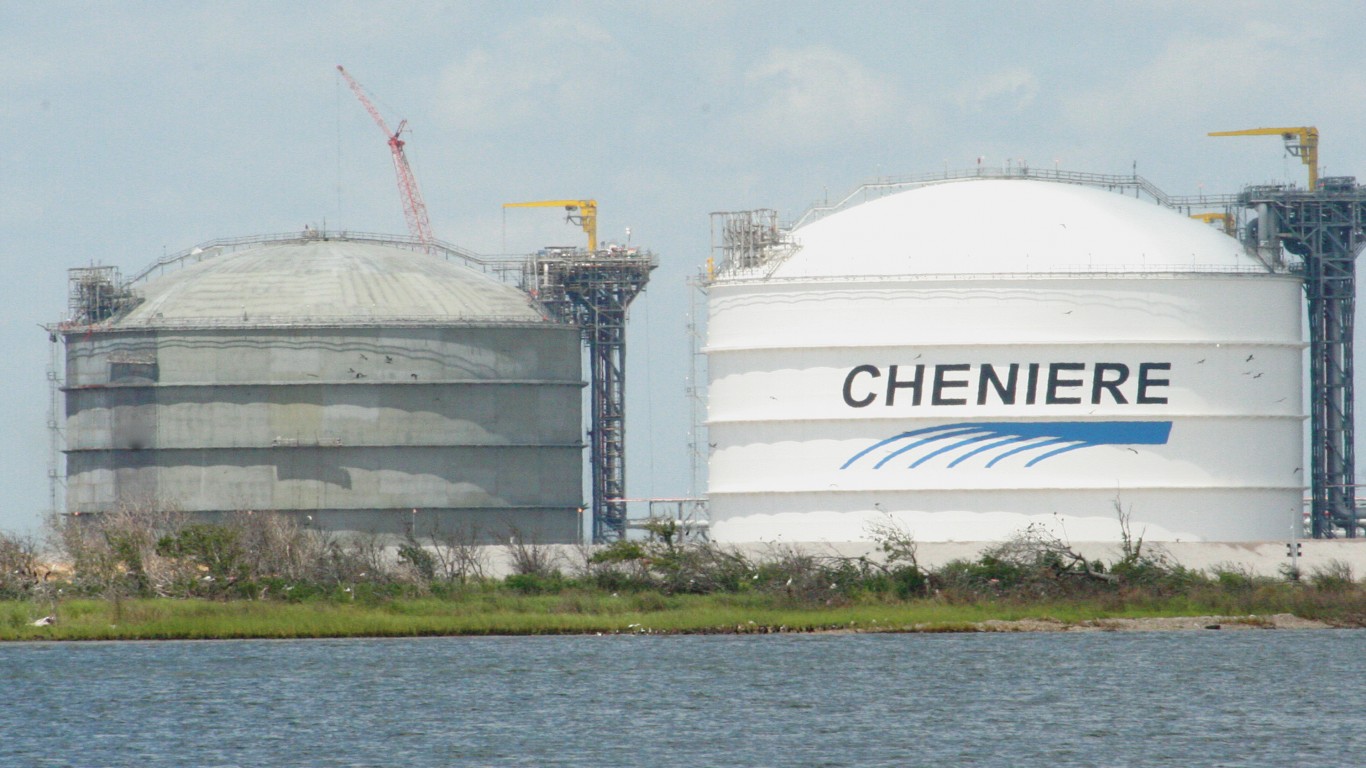

While West Texas Intermediate (WTI) crude oil remains about 5.7% below its late-March high, black gold has been trending higher for more than six weeks. Pump prices for regular gasoline have reached a 14-year high U.S. average of $4.63 a gallon Tuesday, according to data from GasBuddy.
According to the U.S. Energy Information Administration, U.S. crude production last week totaled 11.9 million barrels a day, an increase of 900,000 barrels year over year, and U.S. stockpiles of crude fell by 999,000 barrels. Gasoline production was slightly lower but is up by about 200,000 barrels a day to 8.67 million barrels year over year.
Moving both crude oil and its refined products, like gasoline, diesel fuel, and jet fuel, has not only lifted stock prices for producers and refiners, but midstream companies that gather and transport the fuel by pipeline, rail or truck also have seen share price hikes. Analysts at Wells Fargo have reviewed their ratings on four midstream stocks while continuing to believe that demand for their services will remain strong with “robust pricing, wider margins, and growing volumes.”
That forecast does not apply across the board. In a Tuesday review of four diversified midstream companies, the analysts upgraded two and downgraded two.
NuStar Energy
The rating on NuStar Energy L.P. (NYSE: NS) was raised from Equal Weight to Overweight and the 12-month price target was raised from $17 to $18 per common unit. The analysts believe that NuStar is well-positioned to weather the inflationary storm because 95% of its pipeline capacity is regulated by the Federal Energy Regulatory Commission (FERC). If there is any reduction in volume due to demand destruction on the company’s refined products pipelines, an inflation projection kicks in, stabilizing the inflationary impact.
NuStar also has taken steps to cut costs and capital spending by $50 million for the year. The stock has been an underperformer this year, trading at an enterprise value to EBITDA (EV/EBITDA) multiple of 8.4, below the 8.7 multiple for its master limited partnership (MLP) peer group. Risks to the analysts’ new call include elevated leverage and “only modest FCF [free cash flow] after distributions are made. NuStar is also negotiating a contract renewal that represents between 2% and 5% of the company’s EBITDA.
The analysts offer bullish ($20 unit price) and bearish ($16 unit price) scenarios for NuStar. If consumers demonstrate a willingness to pay more than $4.50 per gallon for gasoline, volume and margins for Sunoco could hold up better than expected. The company also has the “potential ability to offset the impact of demand destruction by higher margins / lower costs, [proving] our EBITDA forecast conservative.”
NuStar pays a distribution of $1.60 per common unit, for an annual yield of 9.97%. It was among six stocks we reviewed earlier this month as outstanding dividend payers. The total shareholder return for the past 12 months was negative 2.9%.
Magellan Midstream Partners
Magellan Midstream Partners L.P. (NYSE: MMP) also got a rating boost, from Equal Weight to Overweight, along with a price target boost from $54 to $56 per common unit. Like NuStar, Magellan’s transportation volumes are protected against inflation by contractual escalators. If the producer price index (PPI) rises, the escalator resets the company’s transportation price. The Wells Fargo analysts also expect Magellan to achieve higher margins on butane blending and to sustain wide margins “for the next few years.”
Those margins could be used to buy back some of the MLP’s common units. The analysts have raised their forecast on share buybacks by $50 million annually to $200 million in 2025, 2026 and 2027. A bullish scenario ($61 unit price) would have the PPI remaining elevated into 2023 and share buybacks rising to $300 million during the three-year period. The bearish scenario ($50 unit price) reflects a smaller PPI adjustment, butane blending margins in line with past averages and smaller share buybacks.
Risks to this outlook are primarily to the upside: FCF could increase to $211 million by 2025 and, even though the stock trades at a multiple of 10.7 times estimated 2023 EV/EBITDA (above the 9.7 peer-group average), Wells Fargo thinks this could “prove to be narrower than our forecast suggest if inflationary pressure persists” and the automatic escalators are engaged.
Magellan pays a distribution of $4.14 per common unit for an annual yield of 7.99%. The total shareholder return for the past 12 months was 14.6%.
Sunoco
The analysts have downgraded the common units of Sunoco L.P. (NYSE: SUN) from Equal Weight to Underweight and cut their $46 price target to $41. The analysts, however, believe that while current high prices have not yet affected demand or margins, “rising gasoline/diesel prices (which will likely continue on this trajectory over the summer, due to high crude oil prices, tight refining capacity, and strong export demand) will eventually lead to demand destruction and lower margins.” Wells also warned of inflation-related margin pressure and backwardation in the commodities market (near-term prices are higher than expected future prices).
As was the case with Magellan, the analysts offer bullish ($20 unit price) and bearish ($16 unit price) scenarios. if consumers demonstrate a willingness to pay more than $4.50 per gallon for gasoline, volume and margins for Sunoco could hold up better than expected. The company also has the “potential ability to offset the impact of demand destruction by higher margins / lower costs, [proving] our EBITDA forecast conservative.”
Sunoco pays a distribution of $3.30 per common unit, for an annual yield of 7.99%. The total shareholder return for the past 12 months was 27.6%.
Cheniere Energy Partners
Cheniere Energy Partners L.P. (NYSEAMERICAN: CQP) owns and operates natural gas liquefaction and storage and loading facilities along with a 94-mile pipeline that connects its Sabine Pass liquefied natural gas (LNG) operations with onshore interstate pipelines. Wells Fargo’s analysts have lowered the rating on the company’s common units from Equal Weight to Underweight, while maintaining a price target of $55. The downgrade is primarily a valuation function. The company’s common units trade at an EV/EBITDA multiple of 13.5 compared to an average of 8.6 among its MLP peers and 10.0 for its parent company, Cheniere Energy.
Thank you for reading! Have some feedback for us?
Contact the 24/7 Wall St. editorial team.
 24/7 Wall St.
24/7 Wall St.


